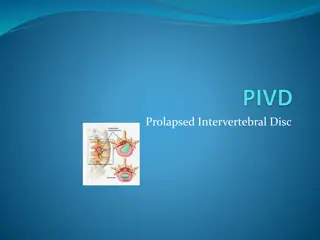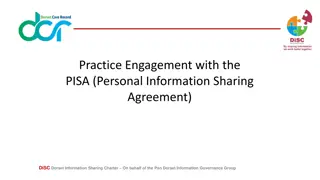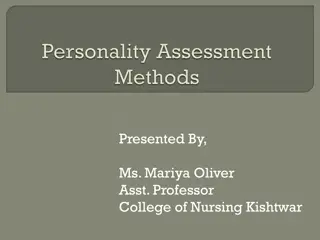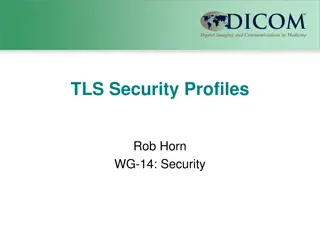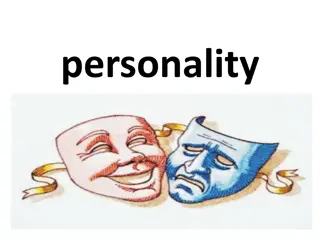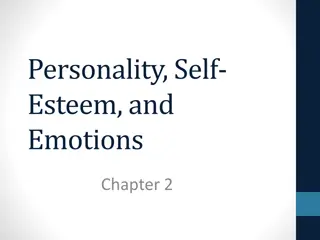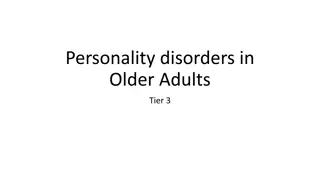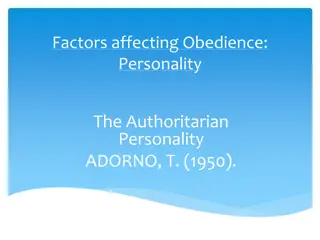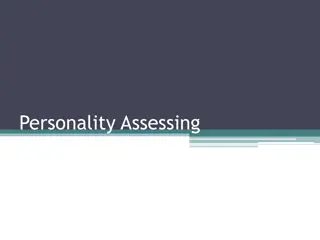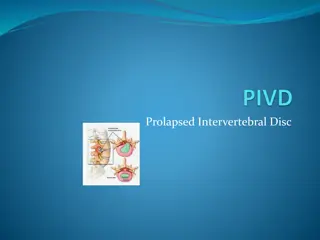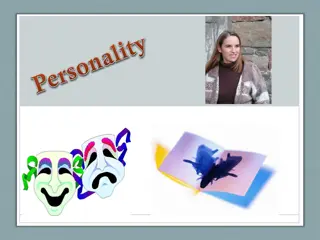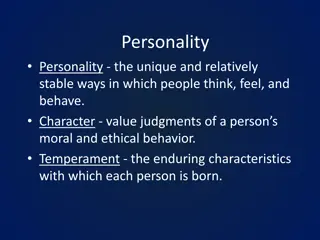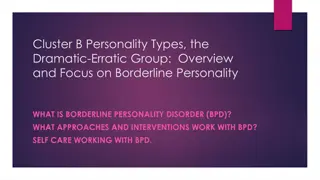Understanding the DISC Personality Profiles
The DISC model, developed by William Moulton Marston, categorizes individuals into four behavioral styles based on whether they are people-oriented or task-oriented, as well as reserved or active. The Dominant (D) style is assertive and decisive, Influential (I) style is charismatic and motivating, Steadiness (S) style values stability and routine, and Compliance (C) style focuses on rules and quality. Each style reflects distinct leadership approaches and preferences in interacting with others.
Download Presentation

Please find below an Image/Link to download the presentation.
The content on the website is provided AS IS for your information and personal use only. It may not be sold, licensed, or shared on other websites without obtaining consent from the author. Download presentation by click this link. If you encounter any issues during the download, it is possible that the publisher has removed the file from their server.
E N D
Presentation Transcript
Personality Profiles The DISC - Concept Extroverted Extroverted The DISC model developed by William Moulton Marston almost a century ago but is just as relevant today. It divides people into four main behavioural styles. Individuals are identified as either People-oriented or Task-oriented. They are further distinguished as Reserved or Active. D D I I People Oriented People Oriented Dominant Dominant Influential Task Oriented Task Oriented C C S S Compliant Steadily Steadily Introverted Introverted screening for business health
Personality Profiles Extroverted Extroverted D D- -style people style people tend to be fast-paced and outspoken. They also display questioning and sceptical traits. You ll notice the D- style acting assertively, making quick decisions, and speaking rather bluntly. D D - - Dominant Dominant Direct Decisive Doer Domineering Demanding D D I I People Oriented People Oriented Dominant Dominant Influential Task Oriented Task Oriented C C S S Compliant Steadily Steadily Introverted Introverted screening for business health
Personality Profiles The I-Style profile type is also known as an influencer or I-style personality type. The I-style Profile types base their authority on their charisma, their ability to motivate people, and by creating a good atmosphere. They are People leaders. The I-style leaders want and need a lot of contacts with people. They thrive on the challenges of new and evolving organizations. Extroverted Extroverted I I- - Influential Influential Inspiring Interactive Interesting Impulsive Irritating D D I I People Oriented People Oriented Dominant Dominant Influential Influential Task Oriented Task Oriented C C S S Compliant Steadily Steadily Introverted Introverted screening for business health
Personality Profiles Extroverted Extroverted The S-style profile s authority is based on experience, expertise and organizational status. They are comfortable, as leaders, in maintaining routines and stability. They are service- orientated. The S-style prefers to lead smaller teams. Their leadership style is participative. D D I I S S - - Steadily Steadily People Oriented People Oriented Dominant Dominant Influential Task Oriented Task Oriented Stable Supportive Sincere Slow Sensitive C C S S Compliant Steadily Steadily Introverted Introverted screening for business health
Personality Profiles The C-style s authority is based on rules and proven standards. They prefer to keep distance from people. C-style leaders emphasize rules and quality focus. They are a things leader; they are more interested in facts, details and analyses. Extroverted Extroverted C C- - Compliant Compliant D D I I Thorough Logical Cautious Reserved Diplomatic Accurate People Oriented People Oriented Dominant Dominant Influential Task Oriented Task Oriented C C S S Compliant Steadily Steadily Introverted Introverted screening for business health
Personality Profiles High D High D Dominant Dominant High I High I Influential Influential High S High S Steadily Steadily High C High C Compliant Compliant Results Challenges Approval Recognition Relations Recognition Doing things right Quality Motivated by Motivated by New challenges Freedom of action Variety Friendly atmosphere Freedom from detail work and control Possibility to convince others Opportunity for specialization Group work Permanent Precisely defined Opportunity for precision Reliable Needed Needed environment environment Difficult tasks Dealing with others Friendship Tried and tested workflows Accepts Accepts Passivity Isolation Conflicts Poor Quality Rejects Rejects Solves problems Decisions Enduring Optimistic Personal Thrilled Supporting Pleasant Loyal Orderliness Thorough Analytical Particular Particular Strengths Strengths Insensitive Impatient Overlooks risks / facts Inflexible Relentless Promises too much Influences others Doesn't finish things Adapts too much Reserved Restrained Misses opportunities Pedantic Focuses too much on details too cautious Possible Possible Weaknesses Weaknesses screening for business health
Personality Profiles High D High D Dominant Dominant High I High I Initiative Initiative High S High S Steadily Steadily High C High C Compliant Compliant Give direct answers Stick to business Enable him to achieve goals Build relationships and be friendly Organize private events Praise his ideas and skills Balanced and friendly are Given time to adapt to change Offer personal support Praise him for his work Always have an open ear for him Give him detailed instructions for his task Reacts to others who Reacts to others who take on routine jobs build relationships gather data evaluate risks get detail work done Commitment to achieving goals Have realistic expectations Taking the initiative for change Solve conflicts for him Helping to recognise connections Convince the other team members of the quality of his task Taking action Helping him to build relationships Needs to others who Needs to others who Authoritarian Attack Compromise Avoidance / Dodging Behaviour under Behaviour under pressure pressure Listening Take a time-out for reflection Taking the initiative Communicating your Would be more Would be more effective through effective through screening for business health own ideas to others
Recommended reading The father of DiSC was William Marston, a psychologist, who published a book in 1928 titled Emotions of Normal People (click here original book). In it, he explained his theory that people exhibit one of four separate behavior types: Dominance, Inducement (now called Influence), Submission (now called Steadiness), and Compliance (now called Conscientiousness) here to download a PDF of the All About the 12 DISC Personality Types | Indeed.com Try the Disc Test DISC Personality Assessment - Take the DISC Test for Free (psycho-tests.com) screening for business health


